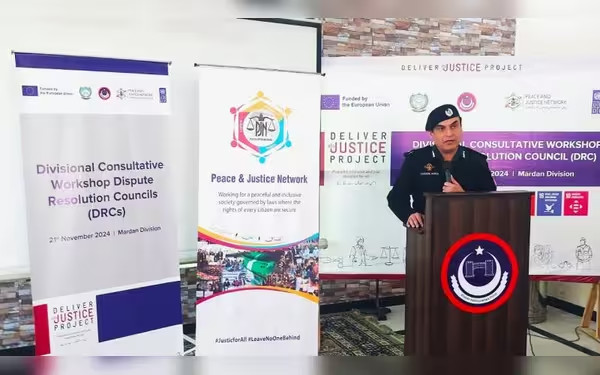Sunday, December 22, 2024 02:08 PM
Strengthening Dispute Resolution Councils in Khyber Pakhtunkhwa
- DRCs provide timely, cost-effective justice in Khyber Pakhtunkhwa.
- Workshop emphasizes gender-responsive DRC systems for inclusivity.
- Collaboration among stakeholders is vital for effective dispute resolution.
 Image Credits: thefridaytimes
Image Credits: thefridaytimesThe workshop in Mardan aims to strengthen Dispute Resolution Councils for timely justice in Khyber Pakhtunkhwa, focusing on inclusivity and community needs.
In recent years, the need for effective dispute resolution mechanisms has become increasingly important in Pakistan, particularly in Khyber Pakhtunkhwa. The traditional court system often faces challenges such as long delays and high costs, making it difficult for ordinary citizens to seek justice. To address these issues, the establishment of Dispute Resolution Councils (DRCs) has emerged as a promising solution. These councils aim to provide timely and cost-effective justice, thereby reducing the burden on formal courts and promoting social harmony within communities.
On Saturday, a consultative workshop was held in Mardan Division to discuss ways to strengthen these councils. Organized by the Peace and Justice Network (PJN) in collaboration with the United Nations Development Programme (UNDP) Pakistan and the Khyber Pakhtunkhwa Police, the workshop brought together representatives from various districts, including Mardan, Nowshera, Charsadda, and Swabi. The event was part of the EU-funded "Deliver Justice Project," which seeks to make justice more accessible and inclusive in Khyber Pakhtunkhwa and Balochistan.
The DRCs, established under the KP Police Act 2017, serve as an Alternative Dispute Resolution (ADR) forum. They provide out-of-court services at the police station, subdivision, and district levels, allowing citizens to resolve disputes without the need for lengthy court proceedings. During the workshop, Mardan District Police Officer Zahboor Babar Afridi emphasized the importance of DRCs, noting their positive impact on community dispute resolution.
District and Sessions Judge Muhammad Zeb Khan also highlighted the critical role that ADR and DRCs play in addressing case backlogs and supporting speedy justice. Experts from UNDP Pakistan and PJN stressed that strengthening DRCs is essential for enhancing their effectiveness in serving communities. They pointed out existing gaps, such as inadequate resources, limited training for members, and a lack of public awareness, which hinder the councils' ability to function optimally.
One of the key takeaways from the workshop was the need for a gender-responsive DRC system. Salma Zeb, a legal aid and ADR Officer, underscored the importance of inclusivity in these councils. Headquarters SP Rizwan Habib echoed this sentiment, calling for gender-sensitive training to ensure that DRCs are responsive to the needs of all community members.
Participants at the workshop shared their experiences, discussing the progress made by DRCs, the challenges they face, and recommendations for improvement. The discussions also focused on the importance of raising public awareness about the services offered by DRCs, ensuring that more people are informed and can access these resources effectively.
As the workshop concluded, actionable recommendations were made, including regular training for DRC members to enhance their skills, increasing public awareness of the councils' roles, and encouraging greater inclusion of women and minority representatives. By addressing these issues, DRCs can become more efficient and responsive to community needs.
Strengthening Dispute Resolution Councils in Khyber Pakhtunkhwa is not just about improving access to justice; it is about fostering a culture of peace and understanding within communities. By empowering these councils and ensuring they are equipped to handle disputes effectively, we can pave the way for a more just and harmonious society. The collaborative efforts of various stakeholders, including law enforcement, the judiciary, and civil society, will be crucial in achieving this goal.













